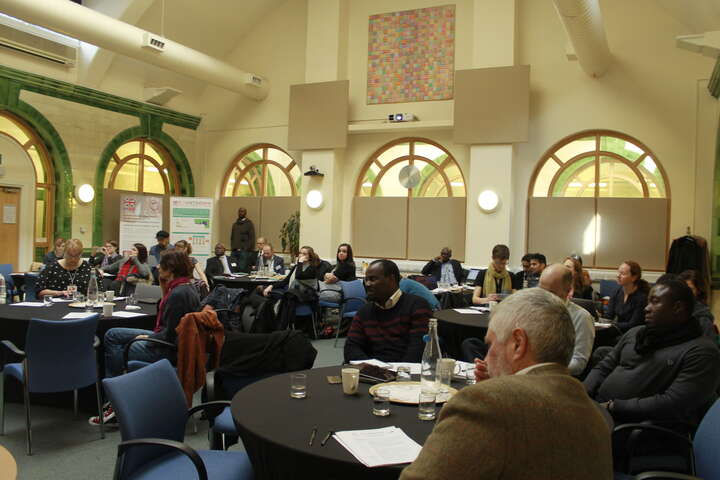
By Laura Dean, Sharon Ngang & Pamela Bongkiyung
The COUNTDOWN project during its Annual Partners Meeting in March 2018 held a panel discussion that focused on finding solutions that were inclusive and integrated for a sustained control of neglected tropical diseases (NTDs). The panel which was made up of multidisciplinary experts from Liberia, Nigeria, Ghana, Cameroon and the UK discussed outcomes from our research informing action towards a successful endgame for NTD control.
In considering leaving no one behind, the first item of business was maximising inclusion in NTD delivery, not just for mass drug administrations but in dealing with morbidity management within wider health system frameworks. The Tanahashi framework was applied by the social science team in our analysis and discussions to identify the population that are lost at certain levels of the service delivery and why. The Tanahashi framework identifies five elements of service provision which should help identify the bottlenecks or areas where people are lost on the pathway to achieving effective intervention coverage. These include: i) Availability of resources such as manpower, facilities and drugs required to provide service; ii) How accessible this service is to the people who need it (how close is the service to its recipients); iii) Acceptability (has the population accepted the service) iv) Actual contact between the service provider and user to establish contact coverage and v) Service performance appraisal as ‘contact between the service provider and the user does not always guarantee a successful intervention related to the user’s health problem or an effective service.’ (Tanahashi, 1978: pg297)[1]
Accessibility and acceptability issues presented as constituting a major challenge to successful MDA campaigns across all partner countries. Factors identified included migrants and border groups, hard to reach areas both socially and geographically, time constraints and difficulty in reaching certain target groups such as out-of-school-children. In terms of acceptability, fear of side effects or perception of links with family planning are hindering factors which led to refusals though incentives such as food provision before drug ingestion increased willingness to receive treatment. In some cases, difficulties in access to highlighted barriers to mass drug administration (MDA) to include timing of MDA, work overload as community drug distributors are few, lack of knowledge about treatment, lack of supervision and monitoring of adverse side-effects. Most important in working towards the control and elimination of NTDs, discussions pointed to a need for context relevant solutions, particularly in hotspot and highly endemic areas where transmission persists.
COUNTDOWN’s research is using a multidisciplinary approach to unpack the influence of socio-economic and demographic factors on participation in and adherence of communities to MDAs in some partner countries. Krentel, Gyapong et al (2018)[2] advance that ‘we must acknowledge the systematic noncompliers as the potential reservoirs of infection but we have done little to understand who these people are, why they have been left out, and what we need to do to reach them. Ignoring these kinds of implementation challenges risks maintaining them in perpetuity. We need the skill and creativity of many disciplines to respond to these challenges.’
During the panel discussion, the issue of rapid results expectations from donors was presented as a major barrier to the sustainability of NTD programmes. There was a call for donors to be more flexible in funding distribution to allow for effective integration of NTD programmes. This is because it is important that finances are directed to areas where they are most needed and the countries are best placed to know that. However, it was added that more effective supervision will be required at all levels to ensure activities are being carried out effectively with the appropriate funds and available resources; reducing supervision costs ensuring more direct cost to the activities. The panel acknowledged that sometimes identifying what is needed for proper integration to occur can be a challenge. This led to a proposal for adapting solutions to the settings as no one size fits all and countries presented varying needs for health infrastructures, sometimes making integration not necessarily the right fit for some. Integration is possible and has great potential for sustainability and inclusivity of NTD programmes, but this can only be possible if the countries take the lead.
Sharing experiences and knowledge was encouraged as knowledge gaps in some cases lead to misdiagnosis of NTDs as has been the experience with Female Genital Schistosomiasis (FGS) whose symptoms are mistaken for that of a sexually-transmitted illness (STI). In Ghana, COUNTDOWN’s research is informing the training materials of professionals and cross-sector collaboration such as getting the educational institutions to understand the issue of FGS and in so doing, avoid issues around FGS such as stigmatisation of young girls. Issues of NTDs go beyond the health sector, so there is a need for a mix of different partners from various sectors to come together to deal with NTDs which should be seen more as a governmental issue rather than simply a health issue.
Discussions highlighted the five key points needed to build long-term sustainability in this area: strengthen country leadership by building local expertise; reinforce country ownership and strengthen structures of health systems. Sustained capacity building at all levels was seen as vital, just as much as getting internal and external funding for needed activities. With all these in place, then we can ensure an inclusive and integrated programme which can be sustained in the long-term for the control and elimination of NTDs.
[1] Bulletin of the World Health Organization, 56 (2): 295-303 (1978)
[2] Krentel A, Gyapong M, Ogundahunsi O, Amuyunzu-Nyamongo M, McFarland DA (2018) Ensuring no one is left behind: Urgent action required to address implementation challenges for NTD control and elimination. PLoS Negl Trop Dis 12(6)
